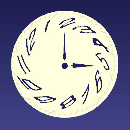

Circadian Sleep Disorders Network is an independent nonprofit organization dedicated to improving the lives of people with chronic circadian rhythm disorders.
We aim to increase awareness within the medical community and among the general public, to provide emotional support and practical ideas for people living with these disorders, to inform patients and health care providers about treatment options, to encourage research into circadian rhythms, and to advocate for accommodations in education and employment for people with circadian rhythm sleep disorders.
Note that Circadian Sleep Disorders Network is not affiliated with any pharmaceutical, medical device, or other company.
Circadian Rhythm Sleep Disorders (CRSDs or CRDs) are neurological disorders in which the sleep-wake cycle is out of sync with the day-night cycle. These include in particular Delayed Sleep Phase Disorder and Non-24-Hour Sleep-Wake Disorder. Also included are Advanced Sleep Phase Disorder, Irregular Sleep Wake Disorder, and Shift Work Disorder, which are defined here.
Delayed Sleep Phase Disorder (DSPD), also called Delayed Sleep Phase Syndrome (DSPS), is characterized by an inability to fall asleep until very late at night, with the resulting need to sleep late in the morning or into the afternoon. Questions? See our DSPD Q&A.
Advanced Sleep Phase Disorder (ASPD), also called Advanced Sleep Phase Syndrome (ASPS), is the opposite. It is characterized by falling asleep very early in the evening, and waking up in the wee hours of early morning, unable to sleep further.
Non-24-Hour Sleep-Wake Disorder (Non-24), also called Free-Running Disorder (FRD), is a condition in which a person's day length is significantly longer than 24 hours, so that sleep times get later each day, cycling around the clock in a matter of days or weeks. Questions? See our Non-24 Q&A.
Some people use the term reverse sleep, referring to the fact that sometimes people with DSPD and Non-24 end up sleeping during daylight and being awake at night.
Please refer to our descriptions,
definitions, and
treatments pages for more details,
and print out our brochure,
fact sheet,
and/or Q&A documents to give to others.
We can progress toward our mission of promoting awareness and accommodation only if we can demonstrate that we represent a community of people who suffer from these disorders. Please join now, so we can better help you and the CSD community in achieving our common goals. Together we have a voice! More details are on the Join page.
Last year's members: if you haven't renewed yet, please do so now. Renew now!
We are a 501(c)(3) organization based in the U.S., serving the global circadian sleep disorders community. We are a patient organization, entirely supported by member dues and contributions. We are all unpaid volunteers.
Circadian Sleep Disorders Network has launched its PATIENT POWERED REGISTRY AND SURVEY for people with Circadian Rhythm Sleep Disorders. The registry is open to anyone with a circadian rhythm sleep disorder from any country. You can sign up for the registry and
take the survey (called a "Patient Insights Network ®") at
CircadianSleepDisorders.org/survey. It's free.
Although we've published some results already, we hope to do a lot more analysis and to include any new participants to improve our statistics.
By collecting information from a large number of people actually suffering from these disorders, we can stimulate research into causes, treatments, and effects of circadian disorders.
We often complain that so little research has been done on people suffering with Circadian Rhythm Sleep Disorders. One reason is the difficulty researchers have in locating people with these disorders. Well, this is your chance! You can make a difference!
The information you provide can jump-start research on some of the questions we've been asking about for years - but only if enough people participate. You can also optionally allow researchers to contact you to participate in studies. Sign up now (free), and please take the survey.
Note that the signup questions that you get first are not the survey! Part of the signup process with Invitae (the registry host) involves answering two pages of demographic questions like age, gender, race, etc. That is not our survey.
After you've finished signing up you will be taken to our survey, called "Circadian Rhythm Sleep Disorders", which asks about your circadian disorders, sleep habits, treatment, and other disorders. Our survey has multiple pages. The actual number is dependent on how you answer some key questions. Please be sure to complete the entire survey. Otherwise, your responses will not be used in analysis.
For more information, and to review the survey instructions and definitions, click here.
Researchers: You can view the survey questions without taking the survey here. You can request participants to contact you for further research by contacting Invitae PIN (Patient Insights Network) (website) or emailing Circadian Sleep Disorders Network at for further information.
 We are asking our members and followers to give our brochure, and/or our Q&A booklets, to their sleep doctors
and their general doctors on their next visits.
It is vital to all of us suffering from circadian disorders that more doctors and their support staff understand these disorders and how disruptive they can be.
The more doctors who know about us, the more patients we can reach, inform, and support. And the larger our membership, the more credible our voice on behalf of all people with circadian sleep disorders.
We are asking our members and followers to give our brochure, and/or our Q&A booklets, to their sleep doctors
and their general doctors on their next visits.
It is vital to all of us suffering from circadian disorders that more doctors and their support staff understand these disorders and how disruptive they can be.
The more doctors who know about us, the more patients we can reach, inform, and support. And the larger our membership, the more credible our voice on behalf of all people with circadian sleep disorders.
You can print out the brochure on U.S. letter paper (8½x11) or on A4 paper (non--U.S.). Booklets can be printed for DSPS or for Non-24 (the same file can be printed on either U.S. or A4 paper). Alternatively you can email us at to request a printed copy of any or all these documents (please specify which, and how many you really need). Be sure to include your name and full postal address. We will send these at no charge to you.

Feb 2026
Author Haley Shapley contacted CSD-N about input for a book she is researching entitled NIGHT OWL. It will explore the science of chronotypes, how sleep habits vary around the world, the history of the night owl stigma and solutions for society to be more inclusive of a range of sleep-wake cycles.
Executive Vice President Alex Wharton spoke with Shapley about CSD-N's mission to increase awareness of DSPD and Non24 and decrease the time to proper diagnosis. She explained various ways that CSD-N advocates for its members, such as offering template letters for requesting accommodations at work and school. She also detailed her own personal history with DSPD and the impact the disorder has had on multiple generations of her family.
Shapley covered Non-24 for SeattleMet magazine, as previously reported here. She also wrote the popular health and fitness book, Strong Like Her.
NIGHT OWL is scheduled to be published by Macmillan's St Martin's Press in March 2027.

Feb 2026
Sighted non-24 is rare, though not as rare as some doctors think. (DSPD is not rare, by their criterion: rare means less than 200,000 Americans.)
The zebras? That comes from what doctors are taught: "if you hear hoofbeats, think horses not zebras." But sometimes it does turn out to be zebras, i.e. the rare diagnosis.
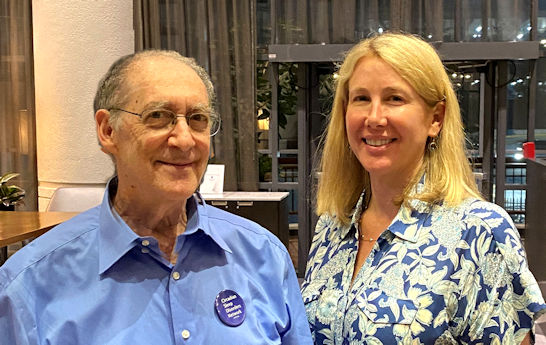
Feb 2026
The Circadian Sleep Disorders Network Board of Directors has elected/re-elected officers to serve for the next two years:

Jan 2026
Project Sleep's Rising Voices leadership program trains people with sleep disorders to become effective advocates through authentic storytelling and public speaking. Graduates are equipped to share their stories with healthcare providers, universities, local communities, news outlets, blogs, and more, to help raise awareness and reduce stigma.
The 2026 Rising Voices training will take place *online* from May 1-June 5. Spots are limited—the application deadline is March 1st, 2026.
For details and application click here.

October 2025
CSD-N Board members Sarah Hazelwood and Andrew Cowen recently met with representatives of the Society of Behavioral Sleep Medicine (SBSM). The working group was composed of medical providers, researchers, and a number of individuals living with Circadian Rhythm Disorders. Those with CRDs shared thoughts on their experiences living with these conditions as well as navigating medical care. The group discussed how to prioritize outcomes for sleep interventions. The volunteers weighed in with the medical providers about their priorities and concerns with their sleep disorders, and what each might consider as ideal outcomes when working with medical professionals.

November 2025
Nominations for the CSD-N Board of Directors have closed. One new candidate, Stephen Mathewson, has volunteered to run. Two current Board members, Sarah Hazelwood and Peter Mansbach, are running for re-election.
Since there are three candidates for three slots on the Board, it is not necessary to conduct formal balloting by the membership.
New Board members begin to serve at the start of the next meeting, on Jan 15, 2026.
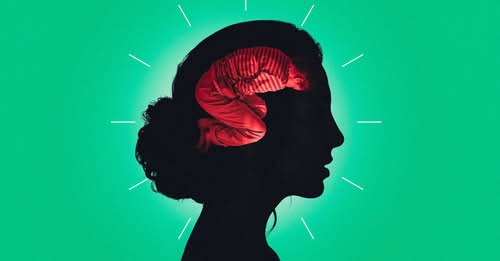
October 2025
Naomi Mittet, former CSD-N secretary and board member, was interviewed for an article in SeattleMet, What It's Like to Truly Be Sleepless in Seattle - Life with a circadian rhythm sleep disorder, by Haley Shapley.
Naomi describes her child's struggles with school, and her own gradual realization that Non-24 was behind those struggles. Another interviewee, Tyler Zuck, describes his experience with DSPD.
October 2025
Circadian Sleep Disorders Network will be holding elections for its Board of Directors. Requirements are described here.
Meetings are held by online forum, so you can log in at any time of day (typically once a day) to read what's been posted and post your replies. Meetings do continue for two months or more, though often not very actively.
If you're interested, please let us know soon (latest Nov 15), following the instructions at the end of the above document. Directors start serving January 15, 2026. Terms generally run for two years.
Currently running for re-election to the board are Peter Mansbach, Sarah Hazelwood, and (provisionally) Samuel Bearg.
We are also often looking for other volunteers willing to help. These can be board members but do not have to be. If you're interested in volunteering, please let us know, including any skills you have. In particular, we need a secretary, who may be, but does not need to be, a board member.
Oct 13, 2025
 CSD-N president Peter Mansbach was interviewed by Abigail Myers, a Ph.D. student at the University of Vermont. Ms Myers is a participant in the National Science Foundation's I-Corps (Innovation Corps) program.
CSD-N president Peter Mansbach was interviewed by Abigail Myers, a Ph.D. student at the University of Vermont. Ms Myers is a participant in the National Science Foundation's I-Corps (Innovation Corps) program.
She was interested in the problems circadian rhythm sleep disorders patients face, our needs for research, and how that research might translate into practice. She was particularly interested in melatonin. Peter reviewed some of his own experiences, and referred her to our Needed Research document and our survey results publication.
This is a free mailing list support group for people with DSPS and Non-24 to share their experiences. It's a good place for people just discovering these disorders to hear how others deal with them, as well as for long-time participants to get support and to provide support to others. There are often discussions of evolving treatment, useful to all. For further information, and to sign up, go to www.circadiandisorders.org/list.
Note that membership in Circadian Sleep Disorders Network and membership on this email list are completely separate.
Circadian Sleep Disorders Network is affiliated with this email list, and our volunteers assist the list administrator with some chores. CSD-N was formed by participants on this list, and many of our members post regularly. But we have no control over what appears or who can join, and list membership is completely separate from membership in CSD-N.
Once you've signed up for the list, you post by sending an email to Everyone on the mailing list receives that post as an email, and you receive everyone else's posts as emails. If you don't like to get separate emails, you can opt to receive in digest form, typically one email a day containing all the day's posts. You make that selection after signing up by logging in (using the password you created when signing up for the email list) at www.circadiandisorders.org/list.
There are some rules:
The rules that the list software enforces are
An additional rule is PLEASE do not just reply to a message with a subject line containing "Niteowl Digest, Vol xxx, Issue xxx". That is obviously not informative and if you aren't careful you may include the whole list of messages in the Digest, making your message too large for the list.
Digest or not, it is a good idea to trim whatever you are replying to leaving just enough for people to know what you are replying to.
Of course, don't be snippy or insulting, and please take off-topic conversations off-list. And no advertising.
Once you've signed up for the list, you can also browse previous posts in the archive at
lists.circadiandisorders.org/private.cgi/niteowl-circadiandisorders.org/.
There is also a mirror of the archive on Yahoo at https://groups.yahoo.com/neo/groups/nite-owl/info. This is useful when the primary archives are not working, as sometimes happens. Login to your Yahoo account, or create one (free) - link is at the top right on that page. Then you have to join the Yahoo copy of the list - this is separate from signing up for the list itself - there is a button on the Yahoo page to do this.
To unsubscribe from the Niteowl email list go to
http://lists.circadiandisorders.org/listinfo.cgi/niteowl-circadiandisorders.org
and follow the directions at the bottom of the page. You will need to know your list password.
If you do not know your list password, send email to
niteowl-request@lists.circadiandisorders.org
with PASSWORD in the subject line. This email must come from the same email address that you subscribed from (which is the one your incoming Niteowl list emails go to). Your password will be sent to you at that address.
If that doesn't work, you can unsubscribe by sending email to
niteowl-request@lists.circadiandisorders.org
with UNSUBSCRIBE in the subject line. This email must come from the same email address that you subscribed from (which is the one you your incoming Niteowl list emails go to). If you do this, you will get an email back asking you to confirm. You must follow the instructions and confirm, or you will not be unsubscribed.
For more (or more current) help on list commands, send email to
niteowl-request@lists.circadiandisorders.org
with HELP in the subject line.
 Our brochure is geared to the general public, to introduce DSPD (DSPS) and Non-24 to people experiencing symptoms of these disorders, and to their families.
Please distribute it to anyone who may be interested.
Print on lightly colored paper for some color, if you like. We used ivory.
Our brochure is geared to the general public, to introduce DSPD (DSPS) and Non-24 to people experiencing symptoms of these disorders, and to their families.
Please distribute it to anyone who may be interested.
Print on lightly colored paper for some color, if you like. We used ivory.
| Brochure - web display |
Print on US letter size paper, PDF Print on A4 size paper, PDF |
The web display version shows the brochure panels in easy-to-read order. The print versions are meant to be printed out on both sides of a sheet of paper, then folded in thirds, creating a brochure. (In the print version, the panels will appear out of order on-screen.)
We have posted documents describing DSPD (DSPS) and Non-24, in an easy to read Question-and-Answer format. These are designed to give to family members, friends, employers, and school personnel, to help them understand these disorders. Feel free to print and distribute these. There are two different (but similar) versions, one for DSPD and the other for Non-24:
| DSPD Q&A - web | printer | booklet* |
| Non-24 Q&A - web | printer | booklet* |
The web formats display nicely in your browser.
The printer versions are formatted by your browser for printing a multi-page document.
The booklet forms are pre-formatted PDF files that you can print on two sides of a single sheet of paper, which then folds in half into a booklet.
* When printing the booklet, be sure to flip on the short edge (select this option if you have a double-sided printer).
| Spanish: | DSPS Preguntas y Respuestas - web | printer |
| No-24 Preguntas y Respuestas - web | printer | |
| German: | DSPS F&A - web | printer |
| Non-24 F&A - web | printer |
We also have a one page Basic Fact Sheet that introduces DSPD and Non-24 to people who don't know about them. It's a quick and easy read, just the basics.
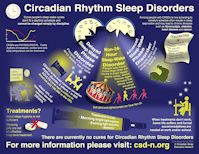 Former board member and artist Lily Style has created an infographic describing Circadian Rhythm Sleep Disorders. View it in your browser at www.circadiansleepdisorders.org/docs/CRSDGraphic.php. Feel free to repost the graphic to help raise awareness.
Former board member and artist Lily Style has created an infographic describing Circadian Rhythm Sleep Disorders. View it in your browser at www.circadiansleepdisorders.org/docs/CRSDGraphic.php. Feel free to repost the graphic to help raise awareness.
You can print it directly from your browser (we suggest making the browser window full screen - the image will resize). We are also posting JPG images in various proportions for printing directly on different sizes of paper:
You can download these (in Microsoft Windows, right-click and select Save As). To print in Microsoft Windows, right-click on the downloaded file (in File Explorer) and select Print. Or open it in a photo- or image-processing program to use that program's features such as borderless printing.
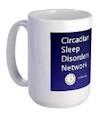 We had offered merchandise (mugs, T-shirts, tote bags, bumper stickers, and a messenger bag) with our name and logo through CafePress,
but our account was closed for lack of activity. We might offer these again at some point, but if no one wants this stuff, there's no point in recreating all the designs.
We had offered merchandise (mugs, T-shirts, tote bags, bumper stickers, and a messenger bag) with our name and logo through CafePress,
but our account was closed for lack of activity. We might offer these again at some point, but if no one wants this stuff, there's no point in recreating all the designs.

Circadian Sleep Disorders Network is a Coalition Partner of Start School Later.
We understand only too well the difficulties many teens have with early school start time, and we support the move to start school later.
This is a list of refences added to our Info page since the last newsletter. The newsletter lists references added since the previous newsletter. These lists are generally available to members only.
This web site is intended to provide generic information about Circadian Rhythm Sleep Disorders, and
is not intended to replace discussions with a healthcare provider.
You should not use the information on this website for diagnosing or treating a medical or health condition.
All decisions regarding patient care should be made with your healthcare provider.
Contact:
Email:
Office: 4619 Woodfield Rd, Bethesda, MD 20814
Phone: By appointment only, please.
browser: Mozilla/5.0 AppleWebKit/537.36 (KHTML, like Gecko; compatible; ClaudeBot/1.0; +claudebot@anthropic.com)
PHP version 8.2.30